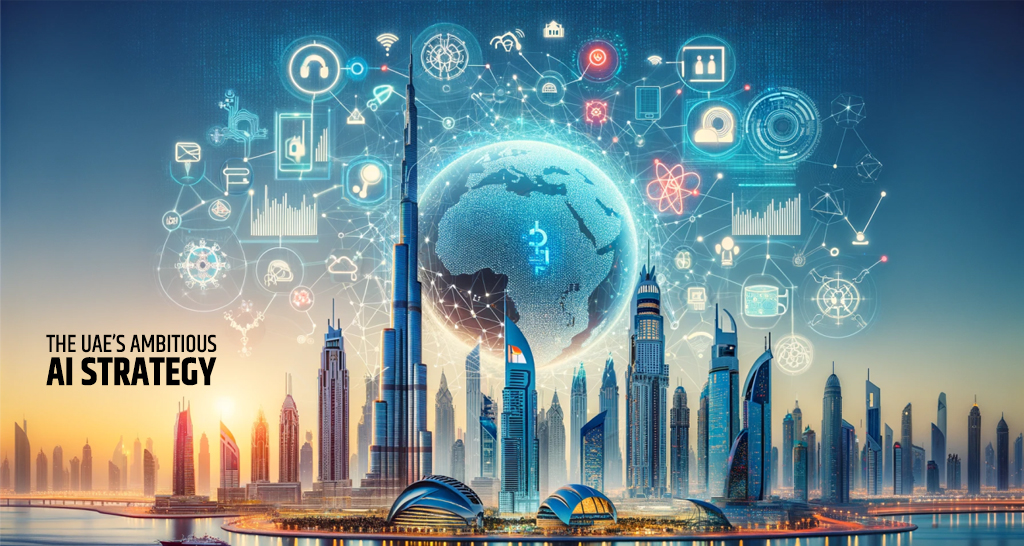In the increasingly competitive world of artificial intelligence (AI), the United Arab Emirates (UAE) is becoming a key player. This is largely due to the strategic vision of Omar Al Olama, the world’s first minister dedicated to AI strategy. Appointed in 2017, Al Olama has been leading the UAE’s initiative to diversify its economy away from oil dependence and establish itself as a global leader in AI by 2031. Under his leadership, the UAE aims to reduce its reliance on oil and achieve global recognition in artificial intelligence by 2031.
A Strategic Partnership with Microsoft
In April, Microsoft announced a significant $1.5 billion investment in G42, an AI group based in Abu Dhabi. This partnership highlights the strategic relationship between the UAE and the United States in developing AI technologies. Analysts suggest that this move was influenced by the Biden administration’s efforts to reduce Beijing’s influence in the region, showing the geopolitical dimensions of AI development.
G42 is chaired by Tahnoun bin Zayed Al Nahyan, an important member of the UAE’s ruling royal family and the national security adviser. The company works in many areas, such as data centers, energy, healthcare, surveillance, and biotechnology. This diversification highlights the UAE’s commitment to using AI in different parts of its economy.
The Economic Imperative
The UAE’s focus on AI is not just about technological advancement; it is also an economic necessity. As one of the world’s largest producers of fossil fuels, Abu Dhabi knows the need to diversify its economic base. A report by PwC Middle East predicts that AI could contribute $96 billion to the UAE economy by 2030, equivalent to nearly 14% of its gross domestic product.
The UAE’s strategic vision is evident in its national AI strategy, which focuses on deploying AI in key sectors such as energy and logistics, developing a robust AI ecosystem, and attracting top talent to maintain a leading position at the frontier of technology.
Building an AI Workforce
The UAE is investing a lot in training people to support its AI ambitions. By September, the country had 120,000 people working in AI or related fields, a significant increase from 30,000 two years earlier. Dubai especially wants to teach a million citizens how to effectively guide AI models to create high-quality outputs. This focus on education and skills is a key part of the UAE’s strategy to become an AI superpower.
Balancing Global Relationships
Navigating the global political scene is a key part of the UAE’s AI strategy. The country often prioritizes its relationship with the US, which sometimes affects its ties with other countries. For example, a US Congressional committee called for an investigation into G42’s connections to Chinese military companies and intelligence services. This shows the careful balance the UAE must maintain. In response, G42 decided to stop using Chinese hardware suppliers, including Huawei, and chose US companies instead, showing the UAE’s alignment with American interests.
The UAE’s alignment with the US is evident through their cooperation in various sectors. The US has sold tens of billions of dollars’ worth of military equipment to the Gulf nation, particularly in defense. The US emphasizes the need for countries to take sides on specific technologies.
Technological Leadership and Innovation
The UAE’s ambition to lead in AI is also reflected in its technological advancements. In late 2023, Abu Dhabi’s government-backed Technology Innovation Institute introduced Falcon10B, a large language model (LLM). Which performed better than models from Google and Meta by some metrics. This development was a significant milestone, highlighting the UAE’s role in the AI competition.
In addition, a collaboration between Abu Dhabi’s Mohamed bin Zayed University of Artificial Intelligence, Silicon Valley’s Cerebras Systems, and G42’s Inception subsidiary resulted in Jais. This AI model is capable of generating content in both Arabic and English. This model sets a precedent for similar AI models in less commonly used languages, demonstrating the UAE’s commitment to inclusive AI development. Unlike closed systems like ChatGPT and Google’s Gemini, Falcon and Jais are open-source, meaning anyone can access and modify their code. This approach positions Abu Dhabi as a supporter of developing countries that may lack the resources to develop their own AI technologies.
Financial Strength and Future Prospects
The UAE’s extensive oil wealth provides a significant financial advantage in developing the costly infrastructure necessary for AI, positioning it as a potential leading tech power in the future. The UAE’s ability to invest heavily in AI infrastructure and talent is crucial as it aims to compete with global tech giants. This shows the country’s long-term goal of becoming a top technology leader.
Global Regulation and Ethical Considerations
As AI technology advances, people worry more about its potential risks. Al Olama wants countries worldwide to work together to control how AI is made and used. He says we need global cooperation to handle the problems AI might cause. A report from the US State Department in March said that the most advanced AI systems could even threaten human existence in a worst-case situation.
Al Olama expresses concerns about the misuse of AI, such as deepfakes causing a fundamental truth crisis and the potential creation of biotech weapons, noting the lack of adequate guardrails to prevent these scenarios.
Omar Al Olama is leading the UAE’s ambitious AI strategy, aiming to transform their technology and economy. By building strategic partnerships, investing in talent development, and navigating the complex geopolitical landscape, the UAE aims to become a global leader in AI. As the world deals with the ethical and regulatory challenges of AI, the UAE’s approach serves as a model for balancing innovation with responsibility.

